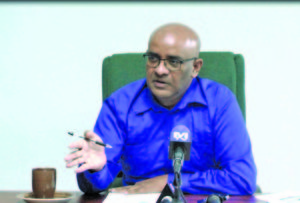As Guyana’s foreign currency reserves continue to deplete daily, there are no signs of this changing anytime soon, especially with the G$30 billion syndicated bond that was recently secured by the Special Purpose Unit (SPU) of the National Industrial and Commercial Investments Limited (NICIL) to assist with revitalisation of the cash-strapped Guyana Sugar Corporation (GuySuCo).
This is according to Opposition Leader and General Secretary of the People’s Progressive Party (PPP), Bharrat Jagdeo, who told a news conference on Wednesday that when the spending of the G$30 billion bond begins, it will substantially increase the demand for foreign currency and put pressure on the reserves.
“What will happen is: it will put enormous…even more pressure on the foreign currency holdings, because you have more Guyana dollars being spent chasing the same supply of currency… In fact, not the same amount, because it is falling; it is declining because sugar earns less foreign currency…because of the drop-in production and exports, and other sectors have not been doing that well, like forestry,” he stated.

Jagdeo said that, from all indications, there has been an unbelievable shortage of currency at the Central Bank. The reserves, according to him, have been declining, and there is no foreign currency to meet their obligations.
“So we are going to have some major problems in the near future. And so we are going to see this evolve a bit more, because you can’t hide it for long. This is not the end of the problem,” he added.
He referred to his last budget debate presentation, when he spoke about how much of the National Budget (the economy) is funded from domestic saving rather than foreign inflows.
“It’s above 90 per cent. It used to be, in our era, about 50 percent each of national domestic expenditure funded from foreign sources, and 50 percent from domestic savings, and now it’s gone up,” he pointed out.
Crackdown
Government recently announced plans to implement a crackdown after it was found that local businesses were not abiding by Bank of Guyana (BoG) Act 1998 by trading US dollars where businesses are accepting foreign currency for the purpose of settling payments for transactions, instead of Guyana dollars.
A statement from the Bank of Guyana (BoG) stated that pursuant to section (20) of the Act, all monetary obligations or transactions in Guyana shall be settled in Guyana dollars. It reminded also that only banks and licensed cambios were authorised to conduct buying and selling of foreign currencies, while noting that penalties were attached for violations, which include fines and imprisonment.
But Jagdeo said that despite plans for a crackdown, based on his party’s intelligence, there have been reports about alleged meetings with Natural Resources Minister Raphael Trotman and calls from the Central Bank to persons demanding that they have to sell part of their money to the bank or to the Gold Board.
With the recent influx of foreign shoppers into Guyana, Chinese businesses have been receiving enormous sales, and have been engaged in trading US dollars. This is something the BoG said it is aware of because it has received complaints in this regard. The BoG has also said this is lending to the issue of foreign currency shortage, and has cautioned these businesses must desist from this practice, as it plans to investigate thoroughly.
But former Presidential Advisor and Economist Ramon Gaskin has since advised that the BoG and Government look at persecuting those found culpable instead of issuing basic reminders. He feels that unless businesses and persons are made an example, people would not take the warnings seriously.
In March 2018, the Statistical Abstract published by the Bank of Guyana reported that the net international foreign currency reserves at the Central Bank were US$498.5 million, a 16 per cent decrease from 12 months prior, which economists and financial analysts had said it is worrying.
They have argued that Guyana’s export sectors are under a clear and present danger as the Finance Ministry continues to under serve them, which has also led to a decline in the international reserves. These international reserves are composed of cash and other assets denominated in mainly US dollars.
The foreign currency inflows also from the Guyana Sugar Corporation (GuySuCo) are set to decrease by a further US$10 million over 2018 as a result of the closure of three more estates. (Samuel Sukhnandan)



